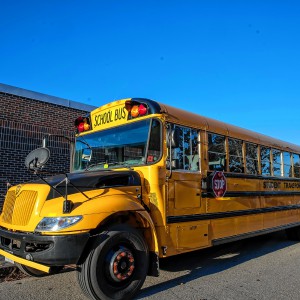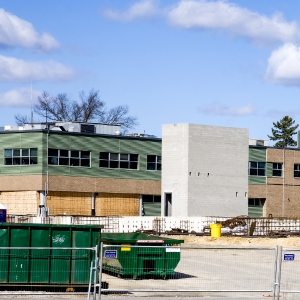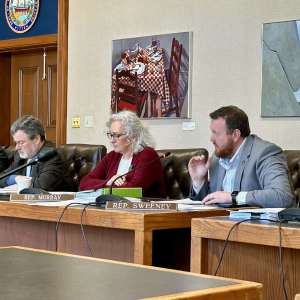The school district charter amendments passed. What now?
| Published: 11-06-2024 4:49 PM |
School board member Jim Richards said he saw no clear edict from voters Tuesday on where the new middle school should go.
Board president Pam Walsh, who pledged to abide by the results of Tuesday’s vote if the charter amendments passed requiring public approval to relocate a school, said the board will meet with legal counsel this week to figure out what its options are moving forward.
Longtime member Barb Higgins, who along with Walsh was re-elected to the board this week, said she thinks it’s time to put the board’s $152 million middle school project on hold entirely and start from square one.
None of them are calling for the school board to promptly reverse course and build anew where Rundlett Middle School currently sits in the South End.
“The way I see it, this will have to go to a ballot,” Richards said Wednesday morning. He views the amendments’ success as residents wanting more control over the future of the project, not as a unified call to rebuild at the current site.
“The message was pretty clear that people want a say in this,” he said. However, “to presume all of those people want to build at Rundlett would be inappropriate.”
Only newcomer Sarah Sadowski, the third winning at-large candidate and the only new face joining the school board next year, said she remains “committed to pushing to revisit the decision” behind the location. But she didn’t commit to choosing Rundlett once the debate was reopened.
The school board voted last December to build the new middle school at Broken Ground over vocal support at the time for the current spot, and for the 11 months since it has resisted demands to reconsider, saying that turning back would cost millions of dollars and delay the project by several years.
Article continues after...
Yesterday's Most Read Articles
 House committee defunds relief program for mothers and children, spares SNAP incentives
House committee defunds relief program for mothers and children, spares SNAP incentives
 No high-speed E-ZPass at Hooksett tolls for at least two months
No high-speed E-ZPass at Hooksett tolls for at least two months
 New Hampshire law enforcement to step up traffic enforcement on Route 106
New Hampshire law enforcement to step up traffic enforcement on Route 106
 Schools in Lakes Region explore creating a special education school to bring down costs
Schools in Lakes Region explore creating a special education school to bring down costs
 Work continues on new state psychiatric hospital in Concord
Work continues on new state psychiatric hospital in Concord
 House committee reverses vote, adopts prohibition on DEI activities and spending
House committee reverses vote, adopts prohibition on DEI activities and spending
Now, the school board could avoid putting the project location to a vote by reversing course and keeping it at the current location. If members decide to stick with the new site, they could either call a special election or put a location referendum on ballots in the city election next November. The board also could mount a legal challenge: its attorneys have previously argued that the amendments wouldn’t apply to the current project.
Walsh, who vocally opposed the amendments and who has been a firm advocate for moving the school across the river, said Tuesday night that the board would need to “regroup and figure out its next steps,” but didn’t say what she thinks they should be.
Despite the decisive success of the amendments, Walsh defeated challengers Joe Scroggins and Andrew Winters, two candidates who had argued for an immediate reversal of the location decision and vocally supported the charter amendments.
During the campaign, Walsh said she would “honor” the amendments if they passed. Despite the upcoming meeting with legal counsel, no public meeting to discuss the results is currently on the calendar.
Jeff Wells, a co-founder of the Concord Concerned Citizens group that wrote the charter amendments and shepherded them onto the ballot, sees the up-vote as a clear indication that Concord wants the school board to build in the South End. The amendments received majority support in all 10 city wards, topped 75% in the South End and only fell short of the 60% threshold in one precinct, Ward 5.
“We’re hoping that the board will respond to the vote, take an honest look at why it can’t go at Rundlett,” he said. If it comes to an election, he wants to see that happen sooner, rather than later.
Despite the loss of Winters and Scroggins, Concerned Citizens member Bob Macini said the group is pleased with the result.
“We’ve been characterized as a vocal minority,” he said. “I think this would put that to rest.”
The Concerned Citizens have turned to Higgins, who finished with the most votes in her bid for a fifth term, as their voice on the board moving forward, according to Wells.
Higgins voted against moving the middle school to Broken Ground last year, but didn’t object as the board went ahead with its plans. In an October campaign interview with the Monitor, she said she felt it was “too late to start over.” On election night, she struck a different tone.
“Part of me thinks we should just stop. Just make the whole thing stop. We should put the whole thing on the table and start over,” she said. “Yes, Rundlett is inadequate. The heat is weird and the roof leaks. But this is New Hampshire… No child is going to die.”
Sadowski lives across the street from the proposed new location. She didn’t share her views on the charter amendments during the campaign to not “tip the scales.” In an interview Tuesday night, she continued to keep her personal views quiet: she wouldn’t say whether she ended up voting for them or whether, if the decision was reopened, she would have a preference on the location.
“It’s time to listen to the voters and take a look at things,” she said.
For Higgins, the success of the amendments cemented what she saw as an error by the board 11 months ago. At the December meeting where the board chose the new site at Broken Ground, a motion she made to table the decision failed.
“On December 6 we could’ve just tabled this vote and none of this probably would have ever happened,” she said.
Statewide election results could influence the current school design and its $152 million price tag.
Governor-elect Kelly Ayotte is currently poised to have the backing of a Republican supermajority in the New Hampshire Senate and a secure majority in the House. With the elimination of the interest and dividends tax and the sunset of federal pandemic money flowing into the state, the Republican trifecta will face declining revenues in the 2025 budget cycle.
Ayotte hasn’t said where she’d make cuts to avoid raising taxes, and the shortfall could jeopardize State Building Aid, a $50 million-per-year program buoying school construction projects that faced a Republican challenge in the state Senate last year.
Catherine McLaughlin can be reached at cmclaughlin@cmonitor.com









 Henniker ponders what is a ‘need’ and what is a ‘want’
Henniker ponders what is a ‘need’ and what is a ‘want’ Boscawen residents vote to fund major renovation of public works building
Boscawen residents vote to fund major renovation of public works building ‘Voting our wallets’: Loudon residents vote overwhelmingly against $1.7M bond for new fire truck
‘Voting our wallets’: Loudon residents vote overwhelmingly against $1.7M bond for new fire truck In Pembroke, Education Freedom Accounts draw debate, voters pass budget
In Pembroke, Education Freedom Accounts draw debate, voters pass budget
